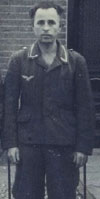Biography Joseph Kotälla
A ‘human devil’, he was called by the former resistance newspaper Het Parool shortly after the war. The paper reported on excavating the victims of Joseph Kotälla in the vicinity of the German concentration camp Amersfoort in November 1945.
As a deputy camp commander, the small SS member was extremely cruel and led several firing squads during the war years. The newspaper stated that Kotälla ‘found his greatest pleasure in looking at tormented bodies and watching the pain and agony in the eyes of the dying’.
After a short trial, a special court for war criminals sentenced Kotälla to death for extensive maltreatment and murder of prisoners in 1948. Three years later, the death sentence was changed to life imprisonment due to diminished responsibility. He died in prison in June 1979. More than thirty years after his death Kotälla is still known in the Dutch collective memory as the embodiment of evil. He was one of the worst ‘Germans’ in the Netherlands during World War II.
As outspoken the image of Kotälla is, as little research has been done on his life and actions during the war. This biography fills this gap. It gives a detailed outline of Kotälla's problematic youth in Upper Silesia, a region that was dominated by ethnic conflicts. The study continues by describing and analysing his career in the German army during the war.
After a brief period at the Eastern Front, he was transferred to the Netherlands. His work in concentration camp Amersfoort is also an important part of this research. It answers the question whether Kotälla with his cruel actions was an exception compared to the other guards in the camp.
Studying the deputy commander gives the perspective of a participant on the notorious camp Amersfoort that has never been used before, namely that of 'perpetroators'. On the basis of unique sources and eyewitnesses accounts it becomes clear what Kotälla thought of himself.
Hitherto the study’s concerning the postwar trial of Joseph Kotälla and the lingering debate on his parole are dominated by the political and public discussion on how to deal with war criminals. This study, however, focuses primarily on Kotälla's motives and interpretations. It provides insight in how he looked back on his life, what he thought of his share in World War II and how he dealt with the lengthy prison sentence that was imposed on him.
Supervisors of this project are Prof. J.W. Renders and Dr. H. Piersma (NIOD Institute for War, Holocaust and Genocide Studies).
Richard Hoving (1971) is a historian and journalist. In 2011 he published Het ‘foute’ kamp. De geschiedenis van het Amersfoortse interneringskamp Laan 1914 (1945-1946).
Email: rhoving71 gmail.com
Press release Prometheus
-
Recensie op Biografieportaal.nl
-
Interview Trouw
-
Interview Ukrant
-
Interview de Volkskrant
-
Article in Reformatorisch Dagblad
-
Interview Dagblad van het Noorden
-
Article in AD
-
Review in Nederlands Dagblad
-
Review in Historisch Nieuwsblad
-
Interview at OVT on Radio 1
-
Interview website RuG


